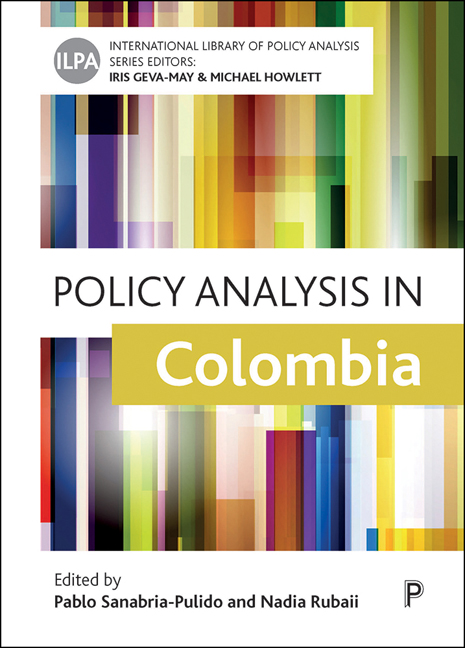Book contents
- Frontmatter
- Dedication
- Contents
- List of Figures and Tables
- List of Abbreviations
- Notes on Contributors
- Editors’ Introduction to the Series
- Policy Analysis in Colombia: An Introduction
- Part One Policy Analysis in Contemporary Colombia
- One The policy Analysis Movement in Colombia: The State of the Art
- Two Evolution of Policy Analysis as a Field of Study and Instruction in Colombia
- Three Policy Analysis, Bureaucratic Capacity and Public Administration Reforms in Colombia
- Part Two Policy Analysis within National and Subnational Governments
- Four Policy Analysis Inside Central Government in Colombia
- Five Policy Analysis and the Legislature in Colombia
- Six Policy Analysis in the Colombian Constitutional Court
- Seven Metropolitan Governance and Policy Analysis in Colombia
- Eight Policy Analysis for Decision Making in Colombian Local Governments
- Part Three Policy Analysis in Key Policy Domains
- Nine Policy Analysis in the Education Sector in Colombia
- Ten Policy Analysis in the Health Sector in Colombia
- Eleven Policy Analysis and Decision Making in the Military Forces: The Havana Experience
- Twelve Technocracy, Decision Making and Economic Policy in Colombia
- Thirteen Social Policy, Target Populations and Policy Analysis in Colombia
- Part Four Policy Analysis Beyond the State
- Fourteen Political Parties and Policy Analysis in Colombia
- Fifteen Policy Analysis and NGOs in Colombia
- Sixteen Media, Evidence and Policy Analysis in Colombia
- Conclusion: Building Capacity for Policy Analysis Amid Tensions and Challenges in Colombia
- Index
Eight - Policy Analysis for Decision Making in Colombian Local Governments
Published online by Cambridge University Press: 10 March 2021
- Frontmatter
- Dedication
- Contents
- List of Figures and Tables
- List of Abbreviations
- Notes on Contributors
- Editors’ Introduction to the Series
- Policy Analysis in Colombia: An Introduction
- Part One Policy Analysis in Contemporary Colombia
- One The policy Analysis Movement in Colombia: The State of the Art
- Two Evolution of Policy Analysis as a Field of Study and Instruction in Colombia
- Three Policy Analysis, Bureaucratic Capacity and Public Administration Reforms in Colombia
- Part Two Policy Analysis within National and Subnational Governments
- Four Policy Analysis Inside Central Government in Colombia
- Five Policy Analysis and the Legislature in Colombia
- Six Policy Analysis in the Colombian Constitutional Court
- Seven Metropolitan Governance and Policy Analysis in Colombia
- Eight Policy Analysis for Decision Making in Colombian Local Governments
- Part Three Policy Analysis in Key Policy Domains
- Nine Policy Analysis in the Education Sector in Colombia
- Ten Policy Analysis in the Health Sector in Colombia
- Eleven Policy Analysis and Decision Making in the Military Forces: The Havana Experience
- Twelve Technocracy, Decision Making and Economic Policy in Colombia
- Thirteen Social Policy, Target Populations and Policy Analysis in Colombia
- Part Four Policy Analysis Beyond the State
- Fourteen Political Parties and Policy Analysis in Colombia
- Fifteen Policy Analysis and NGOs in Colombia
- Sixteen Media, Evidence and Policy Analysis in Colombia
- Conclusion: Building Capacity for Policy Analysis Amid Tensions and Challenges in Colombia
- Index
Summary
Introduction
The rise of decentralization in recent decades has resulted in the delegation of vast responsibilities and more, yet scarce, resources to local governments around the world. Colombia has not been the exception to this trend. Indeed, Colombia has become one of the most decentralized countries in Latin America, with 44.160% (Dirección General del Presupuesto Público Nacional, 2018) of the 2018 national budget being appropriated for transfers to subnational and local governments. These governments are responsible for providing education, health and basic sanitation, among other social services, as well as implementing a broad range of policies set at the national level. In this context, local administrations face policy decisions in different areas and at several stages of the policy-making process.
In making sound policy decisions to improve government effectiveness, local governments require the intensive use of administrative and technical capacity to gather and analyze rigorous evidence and information (Sanderson, 2002). The DNP has stressed the role of social science research to guide policy making and advise executive agencies’ decisions (See Chapter 4 in this volume). This guidance may take the form of advice, analysis, evaluation, research or planning. However, most of the administrative and technical capacity seems to reside with national agencies, which can afford to recruit capable and qualified bureaucrats with a background in social science research. Concentration of the labor market for policy analysts in Bogotá leaves subnational governments with scarce availability of qualified professionals and external consultants, thus affecting the type of policy analysis conducted at the local level.
This chapter aims to explore the availability of policy analysis tools and techniques and their use by Colombian local governments by focusing on three broad themes. The first introduces policy analysis and performance management as tools to achieve local effectiveness. Second, we introduce a framework to understand “when and who” is expected to use policy analysis in local governments. The third section explains the use of policy analysis by local governments for the formulation, implementation and evaluation of their Municipal Development Plan (PMD), the most salient exercise of strategic policy planning at the municipal level. Finally, we develop some conclusions, and suggest some prescriptions to enhance local policy analysis in Colombia.
- Type
- Chapter
- Information
- Policy Analysis in Colombia , pp. 135 - 150Publisher: Bristol University PressPrint publication year: 2020



